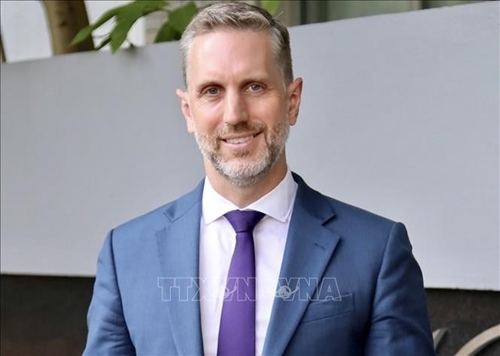In an interview granted to the Vietnam News Agency on the occasion of the World Population Day 2025 (July 11), Jackson stated that UNFPA fully supports the new provision in the amended ordinance and congratulates Vietnam for this progress.
    |
 |
|
Matt Jackson, Country Representative of the UNFPA in Vietnam |
Granting couples and individuals the right to decide when to have children, how many to have, and the spacing between births, in line with their health, living conditions, work, study, and caregiving capacities, is fully aligned with the principles of the International Conference on Population and Development (ICPD), to which Vietnam is a committed signatory, he said.
According to Jackson, this provision also represents a shift in policymaking mindset, moving away from population "management and control" towards a people-centered approach that recognizes personal autonomy and self-determination. It also signals Vietnam’s vision of a fair and sustainable society where everyone can plan their lives with full access to information and state support.
UNFPA believes that this provision is not only critical for protecting rights but also essential for navigating emerging demographic shifts, such as low fertility and population ageing, he said, adding that it lays the foundation for developing inclusive policies, from healthcare and childcare services to flexible work and comprehensive sexuality education, that enable people to make free and responsible reproductive decisions.
"UNFPA stands ready to support the Government of Vietnam in implementing the spirit of this new provision, building a society where 'every person, every choice, every future' is respected and protected", the official affirmed.
He went on to say that UNFPA acknowledges and values Vietnam’s sustained efforts in population policy over recent years, especially the integration of sexual and reproductive health and rights into national strategies and increasing life expectancy.
The country has also made commendable progress in reducing maternal and child mortality, expanding access to modern contraception and promoting comprehensive sexuality education. These achievements reflect the Government’s strong commitment to ensuring that all individuals, especially women, adolescents and vulnerable groups, have access to quality sexual and reproductive health services and can make informed decisions about their lives.
Vietnam’s population work should continue evolving in a holistic, inclusive direction, putting human rights at the center, and framing sexual and reproductive health, responsible parenthood and freedom of reproductive choice as key pillars of sustainable development, he said, noting that this is the best way to ensure that all people, whether urban, rural, wealthy, poor, of any gender or marital status, are able to build the families they desire.
Jackson perceived that Vietnam is making considerable achievements in population policy, particularly in enabling everyone to take control of their own reproductive health and bodily autonomy.
As the country navigates demographic changes such as low fertility and population ageing like many other countries, it is more important than ever to continue advancing rights-based policies, ensuring that every person is able to make informed and voluntary reproductive choices, free from pressure, stigma and discrimination, he noted.
UNFPA calls on governments to address economic barriers that prevent people from achieving their desired number of children; and focus on ensuring equitably shared domestic work, affordable childcare and fertility services, and workplace conditions that empower women.
Reproductive freedom means ensuring rights and choices for everyone, everywhere, he continued, stating that UNFPA is committed to supporting Vietnam on its journey toward building an inclusive and sustainable society for all.
Jackson also highlighted the significance of the theme of the World Population Day 2025 – “Reproductive agency in a changing world”, saying that it is a powerful reminder that reproductive rights are not an abstract concept, they are the foundation of social justice, gender equality and sustainable development.
The theme puts people, their aspirations, lived realities and decision-making power, at the heart of population policies and programs, he stressed.
With this people-centered approach, this year’s theme is especially relevant in the context of Vietnam’s rapid ageing and declining fertility, he said, adding that rather than responding with fear or pressure, this is a moment for Vietnam to reaffirm its human rights commitments and to continue investing in reproductive health, childcare support, comprehensive sexuality education, and protection for women and youth from stigma and discrimination.
Source: VNA